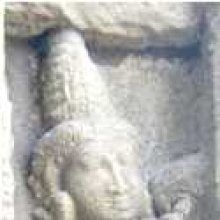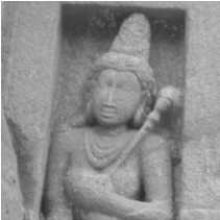Tari, Tārī, Tarī, Ṭārī, Tharī, Thārī: 20 definitions
Introduction:
Tari means something in Buddhism, Pali, Hinduism, Sanskrit, Marathi, Jainism, Prakrit, Hindi, biology, Tamil. If you want to know the exact meaning, history, etymology or English translation of this term then check out the descriptions on this page. Add your comment or reference to a book if you want to contribute to this summary article.
Images (photo gallery)
In Buddhism
Tibetan Buddhism (Vajrayana or tantric Buddhism)
Source: academia.edu: The Structure and Meanings of the Heruka MaṇḍalaTārī (तारी) or Tārā is the name of a Ḍākinī who, together with the Vīra (hero) named Tāra forms one of the 36 pairs situated in the Hṛdayacakra, according to the 10th century Ḍākārṇava chapter 15. Accordingly, the hṛdayacakra refers to one of the four divisions of the sahaja-puṭa (‘innate layer’), situated within the padma (lotus) in the middle of the Herukamaṇḍala. The 36 pairs of Ḍākinīs [viz., Tārī] and Vīras are reddish yellow in color; they each have one face and four arms; they hold a skull bowl, a skull staff, a small drum, and a knife.

Tibetan Buddhism includes schools such as Nyingma, Kadampa, Kagyu and Gelug. Their primary canon of literature is divided in two broad categories: The Kangyur, which consists of Buddha’s words, and the Tengyur, which includes commentaries from various sources. Esotericism and tantra techniques (vajrayāna) are collected indepently.
Biology (plants and animals)
Source: Wisdom Library: Local Names of Plants and DrugsTari [ತಾರಿ, ತಾಱಿ] in the Kannada language is the name of a plant identified with Terminalia bellirica (Gaertn.) Roxb. from the Combretaceae (Rangoon creeper) family having the following synonyms: Myrobalanus bellirica. For the possible medicinal usage of tari, you can check this page for potential sources and references, although be aware that any some or none of the side-effects may not be mentioned here, wether they be harmful or beneficial to health.
Tari in the Hindi language is the name of a plant identified with Melocanna baccifera (Roxb.) Kurz from the Poaceae (Grass) family having the following synonyms: Bambusa baccifera, Melocanna baccifera, Melocanna bambusoides.
Source: Google Books: CRC World Dictionary (Regional names)1) Tari in India is the name of a plant defined with Borassus flabellifer in various botanical sources. This page contains potential references in Ayurveda, modern medicine, and other folk traditions or local practices It has the synonym Pholidocarpus tunicatus H. Wendl. (among others).
2) Tari is also identified with Caesalpinia digyna It has the synonym Caesalpinia gracilis Miq. (etc.).
3) Tari is also identified with Phoenix sylvestris It has the synonym Elate versicolor Salisb. (etc.).
Example references for further research on medicinal uses or toxicity (see latin names for full list):
· J. Investig. Allergol. Clin. Immunol. (2006)
· Pakistan Journal of Pharmaceutical Sciences (2006)
· Botanica Acta (1997)
· Palmiers (1878)
· Enumeratio Plantarum Zeylaniae (1864)
· Flora Indica (1832)
If you are looking for specific details regarding Tari, for example health benefits, extract dosage, pregnancy safety, diet and recipes, chemical composition, side effects, have a look at these references.

This sections includes definitions from the five kingdoms of living things: Animals, Plants, Fungi, Protists and Monera. It will include both the official binomial nomenclature (scientific names usually in Latin) as well as regional spellings and variants.
Languages of India and abroad
Pali-English dictionary
Source: BuddhaSasana: Concise Pali-English Dictionarytari : (aor. of tarati) crossed or passed over.
Source: Sutta: The Pali Text Society's Pali-English DictionaryTari, (f.) (from tarati) a boat Dāvs. IV, 53. (Page 298)

Pali is the language of the Tipiṭaka, which is the sacred canon of Theravāda Buddhism and contains much of the Buddha’s speech. Closeley related to Sanskrit, both languages are used interchangeably between religions.
Marathi-English dictionary
Source: DDSA: The Molesworth Marathi and English Dictionarytarī (तरी).—f ( P) Way by water; as disting. from khuśakī Way by land. 2 or tarī jamīna f Watery grounds; land retaining water. Understood as signifying Rice-grounds.
--- OR ---
tarī (तरी) [or तरीं, tarīṃ].—ad Nevertheless, still, yet, even then; correl. with jarī. 2 At least, not to demand or affirm more. Ex. śambhara nāhīṃ tara nāhīṃ paṇa pāñca tarīṃ dyā. 3 (Poetry.) Then.
Source: DDSA: The Aryabhusan school dictionary, Marathi-Englishtarī (तरी).—f Way by water. Rice-grounds.
--- OR ---
tarī (तरी) [-rīṃ, -रीं].—ad Nevertheless. At least. Then.
Marathi is an Indo-European language having over 70 million native speakers people in (predominantly) Maharashtra India. Marathi, like many other Indo-Aryan languages, evolved from early forms of Prakrit, which itself is a subset of Sanskrit, one of the most ancient languages of the world.
Sanskrit dictionary
Source: DDSA: The practical Sanskrit-English dictionaryTari (तरि) or Tarī (तरी).—&c. See under तॄ (tṝ).
See also (synonyms): tara, taraṇa, taraṇi, taraṇḍa, tarīṣa.
--- OR ---
Tari (तरि).—&c. See under तॄ (tṝ).
Derivable forms: tariḥ (तरिः).
See also (synonyms): tarīṣa.
--- OR ---
Tari (तरि) or Tarī (तरी).—[tṝ-karaṇe i]
1) A boat. धर्मार्थं वाहये तरिम् (dharmārthaṃ vāhaye tarim) Mahābhārata (Bombay) 1.1.48; जीर्णा तरिः सरिदतीव गभीरनीरा (jīrṇā tariḥ saridatīva gabhīranīrā) Udb.; Śi. 3.76.
2) A box for clothes.
3) The end or hem of a garment.
-rī 1 A small wooden baling-vessel.
2) A club.
3) Smoke.
Derivable forms: tariḥ (तरिः), tarīḥ (तरीः).
Source: Cologne Digital Sanskrit Dictionaries: Shabda-Sagara Sanskrit-English DictionaryTari (तरि).—f.
(-riḥ) 1. A boat. 2. A clothe’s basket. 3. The end of a cloth. E. tṝ to pass, Unadi affix in; also with ṅīṣ affix tarīḥ see tara, &c.
Source: Cologne Digital Sanskrit Dictionaries: Benfey Sanskrit-English DictionaryTari (तरि).—tarī, i. e. tṛ10 + ī, f. A boat, Mahābhārata 1, 4014; 4228.
Tari can also be spelled as Tarī (तरी).
Source: Cologne Digital Sanskrit Dictionaries: Cappeller Sanskrit-English DictionaryTari (तरि).—[feminine] boat, ship.
--- OR ---
Tarī (तरी).—[feminine] boat, ship.
--- OR ---
Tarī (तरी).—1. [feminine] v. tari.
--- OR ---
Tarī (तरी).—2. [feminine] = starī.
Source: Cologne Digital Sanskrit Dictionaries: Monier-Williams Sanskrit-English Dictionary1) Tarī (तरी):—[from tara] a f(ī, īs). (īs, [cf. Lexicographers, esp. such as amarasiṃha, halāyudha, hemacandra, etc.]) ([gana] gaurādi, [Gaṇaratna-mahodadhi 48]), a boat, ship (cf. ri), [Mahābhārata i, 4228 f.; Bhāgavata-purāṇa iv; Śiśupāla-vadha iii, 76] (cf. nis-tarīka)
2) [v.s. ...] a clothes-basket (also ri), [cf. Lexicographers, esp. such as amarasiṃha, halāyudha, hemacandra, etc.]
3) [v.s. ...] the hem of a garment (also ri), [cf. Lexicographers, esp. such as amarasiṃha, halāyudha, hemacandra, etc.]
4) [v.s. ...] = raṇi-peṭaka, [cf. Lexicographers, esp. such as amarasiṃha, halāyudha, hemacandra, etc.]
5) [v.s. ...] a club, [cf. Lexicographers, esp. such as amarasiṃha, halāyudha, hemacandra, etc.]
6) [v.s. ...] for starī (smoke), [Horace H. Wilson]
7) Tari (तरि):—[from tara] a f. = rī, a boat, [Mahābhārata i, 4014; xii, 1682; Prabodha-candrodaya vi, 7]
8) [v.s. ...] See also rī sub voce ra.
9) Tarī (तरी):—[from tara] b f. See ra.
10) [v.s. ...] = starī, a barren cow, [Maitrāyaṇī-saṃhitā]
11) Tari (तरि):—b rika, rikin, etc. See [column]1.
Source: Cologne Digital Sanskrit Dictionaries: Yates Sanskrit-English DictionaryTari (तरि):—(riḥ) 2. f. A boat, clothes-basket; end of a cloth.
Source: DDSA: Paia-sadda-mahannavo; a comprehensive Prakrit Hindi dictionary (S)Tarī (तरी) in the Sanskrit language is related to the Prakrit words: Tarī, Tārī.
[Sanskrit to German]
Sanskrit, also spelled संस्कृतम् (saṃskṛtam), is an ancient language of India commonly seen as the grandmother of the Indo-European language family (even English!). Closely allied with Prakrit and Pali, Sanskrit is more exhaustive in both grammar and terms and has the most extensive collection of literature in the world, greatly surpassing its sister-languages Greek and Latin.
Hindi dictionary
Source: DDSA: A practical Hindi-English dictionaryTarī (तरी):—(nf) coolness; dampness; freshness, verdure; curry; wealthiness, richness; —[honā] to be moneyed/wealthy.
...
Prakrit-English dictionary
Source: DDSA: Paia-sadda-mahannavo; a comprehensive Prakrit Hindi dictionary1) Tarī (तरी) in the Prakrit language is related to the Sanskrit word: Tarī.
2) Tāri (तारि) also relates to the Sanskrit word: Tārin.
3) Tārī (तारी) also relates to the Sanskrit word: Tārī.
Prakrit is an ancient language closely associated with both Pali and Sanskrit. Jain literature is often composed in this language or sub-dialects, such as the Agamas and their commentaries which are written in Ardhamagadhi and Maharashtri Prakrit. The earliest extant texts can be dated to as early as the 4th century BCE although core portions might be older.
Kannada-English dictionary
Source: Alar: Kannada-English corpusTari (ತರಿ):—
1) [verb] to separate (a part) from the whole by or as by cutting; to cut; to sever.
2) [verb] to pull, tear off or pluck out.
3) [verb] to damage, injure or mar; to destroy.
4) [verb] to inflict superficial wound; to scratch.
5) [verb] (the head) to lose hair; to become bald.
6) [verb] to beat; to deliver blow or blows; to strike with.
7) [verb] to exempt from an obligation of paying (a tax).
--- OR ---
Tari (ತರಿ):—
1) [noun] the act of cutting, severing off.
2) [noun] the act or an instance of murdering.
3) [noun] rice, wheat etc. that is pulverised into coarse powder.
4) [noun] a rough, uneven surface (of a thing).
5) [noun] a wedge or a stake with tapered or pointed end.
6) [noun] a machine, containing harnesses, lay, reed, shuttles, treadles, etc., for weaving thread or yarn into cloth; a loom.
7) [noun] a small grain (of sand, powdered stone, etc.).
--- OR ---
Tari (ತರಿ):—[noun] the three Acacia catechu (= Mimosa catechu) of Mimosae family; black catechu.
--- OR ---
Tari (ತರಿ):—[noun] that which is used to cross over from one side of the body of a water to another; a boat or ship.
--- OR ---
Tari (ತರಿ):—[noun] a piece of land that is irrigated, as rice field.
--- OR ---
Taṟi (ತಱಿ):—
1) [verb] to separate (a part) from the whole by or as by cutting; to cut; to sever.
2) [verb] to pull, tear off or pluck out.
3) [verb] to damage, injure or mar; to destroy.
4) [verb] to inflict superficial wound; to scratch; to abrade.
5) [verb] (the head) to lose hair; to become bald.
6) [verb] to beat; to deliver blow or blows; to strike wit.
7) [verb] to exempt from an obligation of paying.
8) [verb] ತಱಿದೊಟ್ಟು [taridottu] taridoṭṭu to chap off and pile up the severed parts.
--- OR ---
Taṟi (ತಱಿ):—
1) [noun] the act of cutting, severing off.
2) [noun] the act or an instance of murdering.
3) [noun] rice, wheat etc. that is pulverised into coarse powder.
4) [noun] a rough, uneven surface (of a thing).
5) [noun] a wedge or a stake with tapered or pointed end.
6) [noun] a machine, containing harnesses, lay, reed, shuttles, treadles, etc., for weaving thread or yarn into cloth; a loom.
7) [noun] a small grain (of sand, powdered stone, etc.).
--- OR ---
Taṟi (ತಱಿ):—[noun] the three Acacia catechu (= Mimosa catechu) of Mimosae family; black catechu.
--- OR ---
Taṟi (ತಱಿ):—
1) [noun] a being joined together or associated.
2) [noun] a judgement or conclusion reached or given.
--- OR ---
Tāri (ತಾರಿ):—[noun] = ತಾರೆ [tare]1.
--- OR ---
Tāri (ತಾರಿ):—
1) [noun] a small vessel or a flat structure of logs, used to cross over a body of water; a boat; a raft.
2) [noun] (dial.) a shallow place in a stream, river, etc., where one can cross; fa ord.
--- OR ---
Tāṟi (ತಾಱಿ):—[noun] = ತಾಱೆ [tare].
Kannada is a Dravidian language (as opposed to the Indo-European language family) mainly spoken in the southwestern region of India.
Tamil dictionary
Source: DDSA: University of Madras: Tamil LexiconTari (தரி) [tarittal] 11 verb < dhṛ. intransitive
1. To stop, stand still, rest; நிலைபெற்று நிற்றல். தரியாதே ஓடாநின்றது [nilaiperru nirral. thariyathe odaninrathu] (புறப்பொருள்வெண்பாமாலை [purapporulvenpamalai] 11, ஆண்பாற். [anpar.] 7, உரை [urai]).
2. To abide; இருப்புக்கொள்ளுதல். வணிகன் கண்ட வண்தரித்து [iruppukkolluthal. vanigan kanda vantharithu] (கடம்பவன புரதணம் இலீலா. [kadambavana purathanam ilila.] 53).
3. To stand firm; to be firm; ஊன்றி நிற்றல். வேர் தரித் திருக்கிறது. [unri nirral. ver tharith thirukkirathu.] — transitive
1. To invest, put on, as dress, flowers, etc.; அணிதல். ஆபரணந் தரித்தாள். [anithal. aparanan tharithal.]
2. To keep, support, carry; தாங்குதல். உமை யோர் பாகந் தரித்தானை [thanguthal. umai yor pagan tharithanai] (தேவாரம் [thevaram] 442, 2).
3. To bear patiently, endure; பொறுத்தல். தார்க்குவளை கண்டு தரியா விவண் முகத்துக் கார்க்குவளை [poruthal. tharkkuvalai kandu thariya vivan mugathug karkkuvalai] (புறப்பொருள்வெண்பாமாலை [purapporulvenpamalai] 12, பெண்பாற். [penpar.] 11).
4. To control; அடக்கிக் கொள்ளுதல். மருதரைத தரியா தேத்துவார் [adakkig kolluthal. marutharaitha thariya thethuvar] (தேவாரம் [thevaram] 447, 4).
5. To remember, bear in mind; மறவாது உள்ளத்துக்கொள்ளுதல். கல்விகளையும் அவற்றின் பொருட்கேள்விகளையுங் கற்றுந் தரித்தும் [maravathu ullathukkolluthal. kalvigalaiyum avarrin porudkelvigalaiyung karrun tharithum] (சிலப்பதிகாரம் அரும்பதவுரை [silappathigaram arumbathavurai] 9, 30, உரை [urai]).
6. To chew, as betel; தாம் பூலம் தின்னுதல். தாம்பூலந் தரிக்க வேண்டும். [tham pulam thinnuthal. thambulan tharikka vendum.]
--- OR ---
Tari (தரி) noun < தரி-. [thari-.] Abiding, tarrying, rest; இருப்பு. [iruppu.] (J.)
--- OR ---
Tari (தரி) noun < Urdu tar. [K. tari.] Wet land, opposed to kuṣki; நன்செய் நிலம். [nansey nilam.]
--- OR ---
Taṟi (தறி) [taṟittal] 11 transitive verb cf. tṛd.
1. [K. taṟi, M. taṟikka.] To lop, chop off, cut off, cut down; வெட்டுதல். கையைத் தறித்தான் [vettuthal. kaiyaith tharithan] (திருவாசகம் [thiruvasagam] 14, 7).
2. To untie, unfasten; கட் டவிழ்த்தல். பூட்டினைத் தறித்துவிட்டு [kad davizhthal. puttinaith tharithuvittu] (விநாயகபு. [vinayagapu.] 51, 17).
3. To frustrate, ruin; கெடுத்தல். காரி யத்தை முளையிலே தறிக்கவேண்டும். [keduthal. kari yathai mulaiyile tharikkavendum.]
4. To separate; பிரித்தல். இருவரையும் தறித்துவிடவேண்டும். [pirithal. iruvaraiyum tharithuvidavendum.]
5. To sift by a winnowing fan; தானியம் புடைத் தல். [thaniyam pudaith thal.] (J.)
--- OR ---
Taṟi (தறி) [taṟital] 4 intransitive verb < தறி¹-. [thari¹-.] To be cut off, broken; அறுபடுதல். வாலுங் காலுந் தறிந்து [arupaduthal. valung kalun tharinthu] (இராமநாடகம் உயுத். [iramanadagam uyuth.] 27).
--- OR ---
Taṟi (தறி) noun < தறி¹-. [thari¹-.] [Kanarese, Malayalam: taṟi.]
1. Cutting down, chopping off; வெட்டுகை. [vettugai.]
2. Wooden post, stake; நடுதறி. தறிசெறி களிறு மஞ் சேன் [naduthari. thariseri kaliru magn sendamizhppathirigai] (திருவாசகம் [thiruvasagam] 35, 8).
3. Pillar, column; தூண். கனகனெற்றுந் தறியிடை [thun. kanaganerrun thariyidai] (கந்தபு. வள்ளலார்சாத்திரம்ி. [kanthapu. valli.] 15).
4. Peg; முளைக்கோல். கொடுந்தறிச் சிலம்பி வானூல் வலந்தன தூங்க [mulaikkol. koduntharis silambi vanul valanthana thunga] (பத்துப்பாட்டு: நெடு [pathuppattu: nedu] 58).
5. Weaver's loom; நெய்வதற்குரிய யந்திரம். [neyvatharkuriya yanthiram.]
6. Drum-stick; பறை யடிக்கும் குறுந்தடி. கொட்டுபறை கொட்டுதறி [parai yadikkum kurunthadi. kottuparai kottuthari] (சிவரகசியம் கணபதிவந். [sivaragasiyam kanapathivan.] 20).
7. A kind of axe; கோடரி வகை. [kodari vagai.] Local usage
8. Button-hook, clasp of thread or metal; பொத்தான் கொக்கி. [pothan kokki.] Local usage
--- OR ---
Tāri (தாரி) noun < dhārā. [Telugu: K. dāri.]
1. Way, path, road; வழி. இதுதான் உந் தாரிய தன்று [vazhi. ithuthan un thariya thanru] (கம்பராமாயணம் இரணிய. [kambaramayanam iraniya.] 118).
2. Right mode; முறைமை. தாரியிற் காட்டித் தருஞ்சாதாரி [muraimai. thariyir kattith tharunchathari] (கல்லாடம் [kalladam] 42, 31).
3. Exchange, barter; விலைவாசி. [vilaivasi.] (W.)
--- OR ---
Tāri (தாரி) [tārittal] 11 transitive verb < dhṛ.
1. To bear, endure; பொறுத்தல். மற்றது தாரித்திருத்த றகுதி [poruthal. marrathu tharithirutha raguthi] (நாலடியார் [naladiyar], 72).
2. To possess; உடைத்தாதல். தாரித்திட்டதன் றறுகண்மைக் குணங்களின் [udaithathal. tharithittathan raruganmaig kunangalin] (சூளாமணி சீயவதை. [sulamani siyavathai.] 150).
--- OR ---
Tāri (தாரி) noun cf. tāra. Humming, as of bees; வண்டு முதலியவற்றின் ஒலி. வண்டின் றாரியும் [vandu muthaliyavarrin oli. vandin rariyum] (கல்லாடம் [kalladam] 21, 45).
--- OR ---
Tāri (தாரி) particle < dhārin. A termination forming agent; தரிப்பவன் என்னும் பொருள்படும் விகுதிவகை. நாமதாரி. [tharippavan ennum porulpadum viguthivagai. namathari.]
Tamil is an ancient language of India from the Dravidian family spoken by roughly 250 million people mainly in southern India and Sri Lanka.
See also (Relevant definitions)
Starts with (+127): Tar-invalnan, Tari-irai, Tari-tari, Tari-tumadi, Tari-vilaivil, Tariavva, Tarica, Taricam, Taricanai, Taricanam, Taricanapeti, Taricanavaraniyam, Taricanavicutti, Taricaniyam, Taricappalli, Taricavacceti, Taricavam, Tariccan, Tariciyam, Taricksha.
Ends with (+447): Abhyantari, Accatari, Adakattari, Adakekattari, Adhantari, Aiyampitari, Ajatari, Akacakkattari, Akkitari, Alantari, Amagiraphtari, Amavatari, Anantari, Anatari, Aniyamita-giraphtari, Ankucatari, Antari, Aparavistari, Ashavaritari, Ashvatari.
Full-text (+332): Dari, Tariratha, Dharin, Taritalai, Kulaitari, Veltari, Tankutari, Veshatari, Taripatu, Tarikai, Vayirutari, Rathamtari, Tari-tari, Taripa, Acasko-fal-aankhaa-tari-bhar, Taṟi-irai, Taṟi-kkuṟai, Taṟi-kkadamai, Dhanvamstarigrantha, Dhanvamstarivilasa.
Relevant text
Search found 40 books and stories containing Tari, Dari, Dhari, Tārī, Tarī, Tāri, Taṟi, Tāṟi, Ṭārī, Thaari, Thari, Tharī, Thārī; (plurals include: Taris, Daris, Dharis, Tārīs, Tarīs, Tāris, Taṟis, Tāṟis, Ṭārīs, Thaaris, Tharis, Tharīs, Thārīs). You can also click to the full overview containing English textual excerpts. Below are direct links for the most relevant articles:
Rig Veda (translation and commentary) (by H. H. Wilson)
Hari-bhakti-kalpa-latikā (by Sarasvati Thkura)
Text 44 < [First Stabaka]
Temples of Munnur (Historical Study) (by R. Muthuraman)
The Kaikolas of Munnur < [Chapter 2]
Festivals (Introduction) < [Chapter 6]
Kadava Kopperunjinga II < [Chapter 1]
Pallava period (Social and Cultural History) (by S. Krishnamurthy)
Upanayana ceremony and Sandhya-vandanam ritual < [Chapter 3 - Socio-Religious Life]
The cultural life of the Pallava Period < [Chapter 4 - Material Culture of the People]
Dancing girls in temples < [Chapter 3 - Socio-Religious Life]
Chaitanya Bhagavata (by Bhumipati Dāsa)
Verse 3.3.154 < [Chapter 3 - Mahāprabhu’s Deliverance of Sarvabhauma, Exhibition of His Six-armed Form, and Journey to Bengal]
Verse 3.4.350 < [Chapter 4 - Descriptions of Śrī Acyutānanda’s Pastimes and the Worship of Śrī Mādhavendra]
Verse 3.3.363 < [Chapter 3 - Mahāprabhu’s Deliverance of Sarvabhauma, Exhibition of His Six-armed Form, and Journey to Bengal]
Bhajana-Rahasya (by Srila Bhaktivinoda Thakura Mahasaya)



